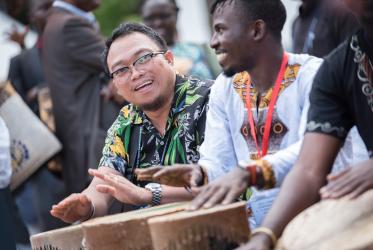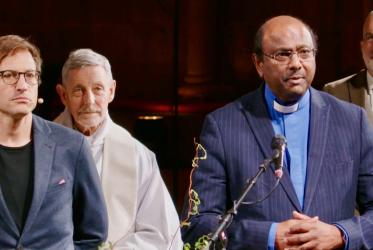Even before Rev. Dr Solomon Mepaiyeda heard about the Ecumenical Institute at Chateau de Bossey, he knew he wanted to study at a reputable ecumenical institution. “I wanted to contribute to collaborative efforts among Nigerian churches,” said Mepaiyeda, a member of the Anglican Church.
Now studying ecumenism at Bossey, Mepaiyeda said that his vision is supported by Bossey’s educational model because the institute brings together students from various religious, cultural and academic backgrounds. “There is solid interaction among students from different regions of the world,” he said.
Bossey about to celebrate 70 years
The Ecumenical Institute at Bossey is officially known as the international centre for encounter, dialogue and formation of the World Council of Churches. Founded in 1946, the institute brings together people from diverse churches, cultures and backgrounds for ecumenical learning, academic study and personal exchange that ultimately can change students’ lives and their global outlooks.
Each year, the Ecumenical Institute welcomes students and researchers from around the world for an intense period of residential academic study, specializing in ecumenical theology, missiology and social ethics. Students have access to the world-class library and other facilities. The teaching faculty is made up of staff from diverse theological, cultural and confessional backgrounds. The Institute is attached to the University of Geneva, which issues its diplomas.
Challenges and opportunities
Like Mepaiyeda, Xiaoyan “Grace” Zhou heard about Bossey from her colleagues. “Several of my coworkers had already studied at Bossey and clearly had benefitted,” she said.
Zhou, who represents the China Christian Council, said she decided to study at Bossey to equip herself with a better theological understanding, particularly from an ecumenical perspective.
Like many students at Bossey, she is a student in the Complementary Certificate (CC) in Ecumenical Studies program. This curriculum is intended for students who have already completed a university bachelor's degree in Christian theology or a closely-related discipline.
The CC in Ecumenical Studies features a core course on the history of the ecumenical movement, which offers an overview of the genesis, development and institutional dimension of modern ecumenism, as well as an introduction to selected contemporary themes and challenges in relation to a globalized world and a changed ecclesial and religious landscape. Students benefit from plenary lectures, class discussions and a final oral exam.
The course of study also includes a workshop on intercultural biblical studies which gives students an opportunity to deepen their exegetical competencies. This course offers students an introduction to the plurality of models and contexts for biblical interpretation, and an evaluation of these models’ ecumenical relevance.
Students also enroll in a workshop on practical ecumenical theology which provides a reflective experience in the historical-cultural modes of theological transmission, and more specifically on their liturgical communication and consideration of the ecumenical dimensions of translating theology in practice.
Students are also required to conduct ecumenical study visits, during which they have an opportunity to gain practical insights on the practices, organization and spiritual life of the work of different ecumenical actors, particularly those of different Christian confessional traditions. Students usually visit the Orthodox Centre of the Ecumenical Patriarchate in Chambésy, Switzerland; the Vatican State and Rome, Italy; the Taizé Community in France; and local parishes of the Reformed Protestant Church in Switzerland.
While meeting these core requirements, students then choose modules that reflect their specific interests.
Module choices include:
• Ecumenical biblical hermeneutics, which offer an introduction and study of exegetical methods in relation to biblical literature, as well as an initiation into biblical research with regard to the vision of reconciliation and human unity in general and of the Christian churches in particular.
• Ecumenical missiology, which provides an introduction and study of areas common to the theology of mission, ecumenical theology and the theology of religions.
• Ecumenical social ethics, which offers an intensive introduction and study of areas common to ecumenical theology, systematic theology and social science of religions, which pertain to the challenges arising from the complexity and plurality of globalized societies, as well as the exploration of ecumenical ethical responses.
• Ecumenical theology, which includes an introduction and study of areas of ecumenical theological research on the search for ecclesial communion as the focal point of ecumenism.
Zhou and other Bossey students said they choose among these modules based on the topics that fit their particular goals and interests. “Apart from the core courses, I have also chosen two modules — ecumenical missiology, and ecumenical social ethics,” said Zhou.
Like her colleague Mepaiyeda, she finds her academic studies augmented by Bossey’s multicultural atmosphere. “It’s both a challenge and an opportunity for everyone here. Also, I am amazed by the different denominations and their liturgies,” she said.
Finding themselves
Zafindravao “Vali” Nomenjanahary, a Lutheran from Madagacar, had developed an interest in ecology and theology, and the relationship between the two. As she finished one of her final papers on ecology and theology to earn a bachelor’s degree, she was searching online for opportunities to discuss her findings. She came across Bossey’s website, then visited Bossey in the summer for a weeklong institute seminar.
She decided to enroll in the full-time program after realizing that the workshops are purposely offered in a multicultural and ecumenical environment. “One can learn about the understanding of others and can see things differently,” she said.
She said she is pursuing the CC in Ecumenical Studies as an academic and cultural cornerstone in her lifelong further education.
Even as she pursues a rigorous academic course of study, Nomenjanahary is also gaining knowledge from daily life at Bossey, which starts with a morning prayer. “At the service of morning prayer, I feel the unity in praying together despite some difficulties in terms of understanding prayers and intercessions,” she said.
Nomenjanahary is also in the process of defining her own theological identity, which changes as she sees herself within the circle of her fellow students at Bossey. “I am discovering my confessional and theological identity,” she said. “In encountering other people from other confessional and cultural contexts, I realize that some elements of my spiritual life and my theology actually come from outside the Lutheran tradition.”
Connections override divisions
Milana Ivkovic first heard about Bossey through her professors at the faculty of Orthodox theology in Belgrade, Serbia. “My professor recommended that I come here and study in Bossey,” she said. “His wish was that the Orthodox Church has very well-educated women in theology.”
“I wanted to study abroad and to meet people from a variety of Christian denominations,” she said, adding that so far her experience has been very positive. “I can conclude that there are many more things that connect us than those that divide us.”
What separates Christians most is not just cultural differences, she said. “What divides us most is our lack of ability to be open to differences and to accept otherness.”
The deadline for applications for the academic year 2016/17 is 30 November 2015. For more information visit the website of the Ecumenical Institute at Bossey.







